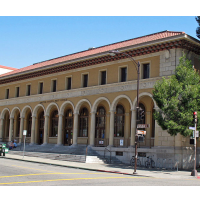U.S. Postal Service Sues Berkeley for Blocking Sale of Historic Post Office
 Historic Berkeley, California, post office (photo: Sanfranman59)
Historic Berkeley, California, post office (photo: Sanfranman59)
By Nicholas Iovino, Courthouse News Service
SAN FRANCISCO (CN) — The U.S. Postal Service has sued Berkeley, California, claiming the city interfered with a federal mandate by passing an ordinance to block the sale of its historic post office building.
The Monday lawsuit in Federal Court is the latest wrinkle in a four-year fight over the 102-year-old downtown post office.
Facing fewer customers and shrinking revenue, the Postal Service in 2011 announced plans to close up to 3,700 branches nationwide.
As part of its cost-cutting crusade, the Postal Service said it would sell its main post office building at 2000 Allston Way in Berkeley, as it needed only 4,000 square-feet of the 57,000-square-foot structure.
After soliciting community feedback, the Postal Service in 2013 said it would sell the building despite a Berkeley City Council resolution opposing it.
In its Monday lawsuit, the Postal Service says it agreed to place conditions on the sale to preserve the property's historic character, but Berkeley demanded $75,000 to enforce a historic covenant for the building.
"Although most covenant holders, including the City of Los Angeles, for example, typically do not charge any fee to serve in that role, the Postal Service offered a payment of $25,000 to the City," the Postal Service said in its complaint. "The City continued to request $75,000."
In September 2014, the Postal Service struck an agreement to sell the building to urban developer Hudson McDonald.
That same month, Berkeley passed a new zoning ordinance restricting the use of the post office building to civic and nonprofit purposes.
In November 2014, the city and the National Trust for Historic Preservation sued the Postal Service in Federal Court to block the sale.
U.S. District Judge William Alsup dismissed both lawsuits as moot in April 2015 because the deal to sell the post office had fallen through.
The Postal Service said the deal was terminated in December 2013 due to Berkeley's zoning ordinance limiting uses of the building.
"The practical effects of the zoning ordinance have fallen only on the Berkeley Main Post Office property, while commercial activity has continued in and around other parcels subject to the zoning ordinance," the Postal Service says in its complaint.
The ordinance has dissuaded commercial developers from buying the building, depressed the market value of the property, and deterred a federal agency from carrying out its mandate under the Postal Reorganization Act, the Postal Service says.
In June 2015, the city reaffirmed its commitment to stop the Postal Service from selling the building, passing a resolution "in opposition to the sale of the downtown Berkeley Post Office."
The Postal Service claims the zoning ordinance violates the Supremacy Clause of the Constitution and preempts federal law by interfering with a federal agency's mandate.
The Postal Service seeks a judgment declaring the ordinance void and a permanent injunction to stop the city from passing any more laws to block the sale of the property.
Berkeley Mayor Tom Bates, who supported the zoning ordinance and other measures to block the post office sale, said he had not seen the lawsuit and declined to comment.
Timothy Burroughs, assistant to the Berkeley city manager, said the City Attorney's Office was still reviewing the complaint.
Built in 1914, Berkeley's main post office was placed on the National Register of Historic Places in 1981. The Postal Service has occupied the building since 1933.
To Learn More:
Sale of Post Office Properties Ignored Historical Importance (by Noel Brinkerhoff, AllGov)
Legislation Offers Hope that Historical Berkeley Post Office Won’t be Part of Nationwide Selloff (by Ken Broder, AllGov California)
Sen. Feinstein’s Husband Reaps Profits from Post Office Closings (by Ken Broder, AllGov California)
- Top Stories
- Controversies
- Where is the Money Going?
- California and the Nation
- Appointments and Resignations
- Unusual News
- Latest News
- California Forbids U.S. Immigration Agents from Pretending to be Police
- California Lawmakers Urged to Strip “Self-Dealing” Tax Board of Its Duties
- Big Oil’s Grip on California
- Santa Cruz Police See Homeland Security Betrayal in Use of Gang Roundup as Cover for Immigration Raid
- Oil Companies Face Deadline to Stop Polluting California Groundwater





